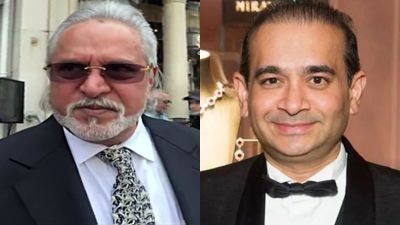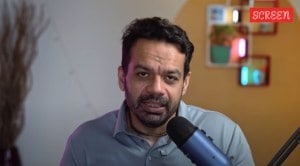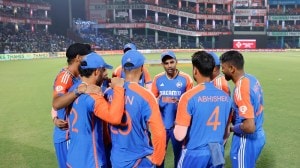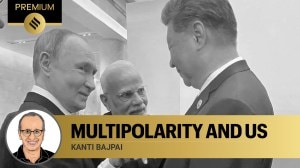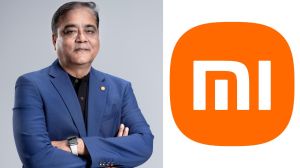V-P Jagdeep Dhankhar rejects Mallikarjun Kharge’s objection to RS discussing Rahul Gandhi’s UK statement
Congress chief writes back to Rajya Sabha chairman, expressing surprise at the ruling and saying that Presiding Officers in legislatures…cannot display their biases or their loyalty to the ruling party
 Rajya Sabha Chairman Jagdeep Dhankhar. (PTI)
Rajya Sabha Chairman Jagdeep Dhankhar. (PTI) As the standoff between the government and the Opposition in Parliament continued, Rajya Sabha Chairman Jagdeep Dhankhar on Wednesday rejected a “point of order” raised by Leader of the Opposition Mallikarjun Kharge that there cannot be any discussion or reference to Rahul Gandhi in the Upper House since he was not a member of the House. Rahul was then a Lok Sabha member.
Kharge had objected to Leader of the House Piyush Goyal demanding an apology from Rahul over the latter’s remarks in London that “democracy is under attack” in India. Goyal had not named Rahul.
While rejecting Kharge’s argument, Dhankhar also said that although MPs enjoy constitutional ‘privilege’ of ‘freedom of expression’ and ‘immunity’ from any civil or criminal action, the “sanctity of the temple of democracy cannot be permitted to be outraged as privilege does not extend to engaging in demeaning Parliament, making disparaging observations tarnishing constitutional institutions or set afloat narratives premised on reckless allegations of untenable fact premise”.
“The authenticated record made available by Leader of House Piyush Goyal bears out that his demand for apology on the overseas statements made by a senior leader of Opposition is factually premised and does not graduate to making ‘allegation of a defamatory or incriminatory nature’,” Dhankhar said, rejecting the point of order raised by Kharge.
Hours later, Kharge wrote to Chairman Dhankhar expressing surprise at his ruling. He said the observations made by Goyal were “patently defamatory, unfounded and vacuous allegations against Rahul Gandhi” and that any contention that he did not refer to Rahul by name does not absolve him of the breach of the parliamentary tradition”.
He said whether Goyal has certified or authenticated his statements have no relevance whatsoever. “The reason being that it is impermissible to make any reference in one House to the member of the other House whatever the circumstance may be…As regards your ruling vis-a-vis my point of order with due humility I must confess that I find it surprising,” Kharge wrote.
Kharge told the Chairman that his refusal to find Goyal’s statements to be prima facie, defamatory give rise to a problematic precedent that has two potential consequences — that “any genuine concerns raised about our democracy by anyone shall be treated as treasonous, anti-India or worse. Imagine the chilling effect that has on a democracy built on the foundation of freedom of speech”. Secondly, “an elected representative of the people of India can be vilified and given no space to defend himself against outlandish, false and even brazen allegations”.
“Neither of these legacies is flattering to this regime or to your decision,” Kharge said.
Significantly, Kharge also argued that “all Presiding Officers in legislatures, and especially the Chairperson are expected to be fair, even-handed and non-partisan. They cannot display their biases or their loyalty to the ruling party”.
Without naming Rahul, Goyal had said that “the shameless way by which a senior leader of the Opposition in a foreign country has attacked the democracy of India, insulted the Parliament of India”. Objecting to his remark, Kharge had on March 13 raised a point of order arguing that “there could be no discussion or reflections in the Rajya Sabha on or about a member of the Lok Sabha or anyone who is not a member of the Rajya Sabha”.
In his ruling, Dhankhar — citing Constitutional provisions — said the constitutional mechanism “stipulates no fetters or restrictions upon the freedom of expression privilege of MPs in Parliament”.
He said Rule 238(A) of the Rules of Procedures and Conduct of Business “does provide for discussion in Rajya Sabha against a Lok Sabha member, subject to requiring previous intimation to the Chairman when it comes to making ‘allegation of a defamatory or incriminatory nature’ by a member against any other member or a member of the Lok Sabha”.
“Thus stipulations in the rules call for a previous intimation to the Chairman only when it comes to making ‘allegation of a defamatory or incriminatory nature’ by a member against any other member or a member of the Lok Sabha and not otherwise,” he said.
Pointing out that Goyal had authenticated his remarks as directed by him, Dhankhar said “any curtailment or qualification of the constitutional privilege of freedom of expression, of a MP in the Rajya Sabha will seriously compromise and impede blossoming of democratic values. Democratic ethos, well cherished and nurtured parliamentary values persuade me to tilt in favour of sustaining this constitutional right of ‘freedom of expression’ of an MP that cannot suffer any constraint and is subject only to the wisdom of the House and the Chairman”.
Significantly, Dhankhar said he was of the “firm view that there can be no issue or individual beyond the purview of discussion in the Rajya Sabha and the same is exclusively subject to regulation by the House and the Chairman.”
Photos





- 01
- 02
- 03
- 04
- 05

